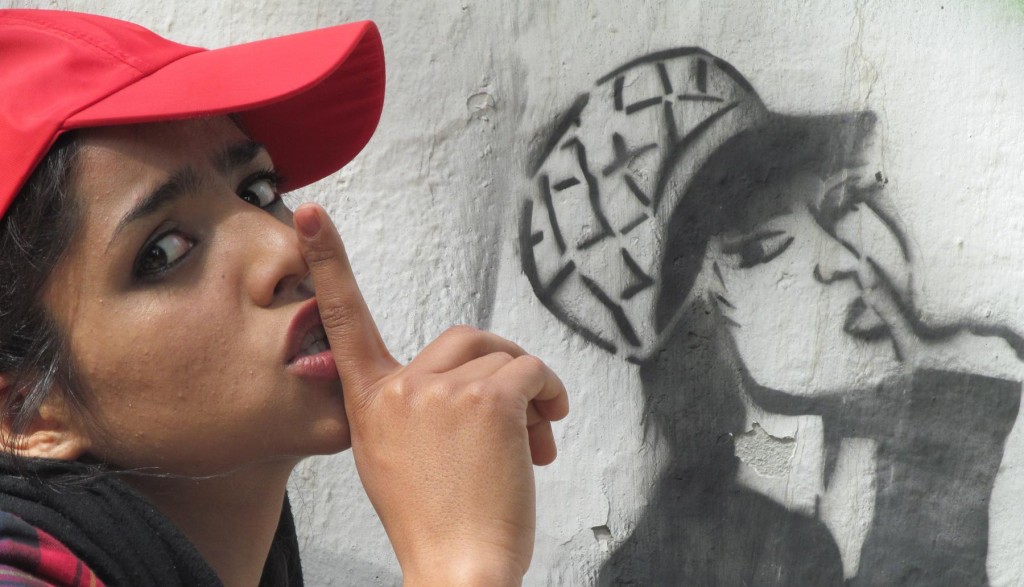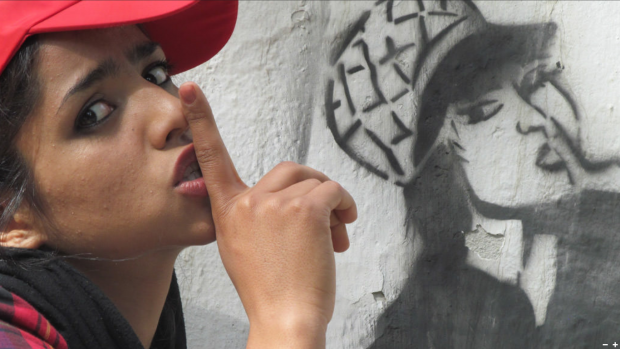SAM SUMMERS reviews ‘Sonita’, a documentary about the Afghan teen pursuing a rap career against the odds.
15 million girls are married as children every year, a figure that is expected to rise to 16.5 million within the next two decades. This is the difficult reality, poorly understood in the West, that Sonita seeks to redress.
The film is centred around Sonita Alizadeh, a charismatic sixteen-year-old Afghan girl who now lives in Iran, having fled from the Taliban as a child. She is one of the few remaining members of her family yet to return to Afghanistan and lives a life thinly spread between her schooling and menial cleaning work – she can hardly afford the tiny flat she shares with her auntie and niece. It’s a difficult existence, hand-to-mouth, but one she approaches with unwavering optimism, remaining natural in front of the camera, with a quick-wit and easy, likeable manner.
We are told that her name translates as “swallow”, meaning the migrant bird, and the appellation is apt. Sonita longs for a wider existence; we see her scrapbooking pictures of Drake and Rihanna, hanging up posters of her favourite Persian rapper Yas, and, in a classroom exercise, her imaginary passport is American, belonging to one “Sonita Jackson”. “It sounds foreign…” her teacher says uncertainly; Sonita flashes her winning smile.
This good cheer belies the daily struggles she endures. Oppressive traditions, familial duty and the spectre of religious violence quietly colour the texture of her life in Iran. We are reminded of the constant demand for propriety when Sonita won’t even remove her headscarf in front of the director – another woman – due to the idle presence of the camera. In one scene, we witness her taking part in drama therapy, recreating a car journey she took with her family as a child. She giggles as her friends portray her brothers and sisters, before reaching the crux of the memory: an ambush by the Taliban at gun point. Laughter turns to tears in the blink of an eye.
Later, joy and sadness blend seamlessly when a younger girl in Sonita’s class announces that her family have sold her to an older man. The group of girls, dressed in matching blue hijabs, respond in a chatter that is relaxed, gossipy even; when Sonita asks “did you get beaten?” she receives a nod, followed by a ripple of knowing grins – all touched by a kind of well-what-did-you-expect fatalism that, here in Britain, might greet the arrival of summer rain. Of course, this insouciance really conceals a deeper sadness, but it’s buried deep beneath the strata of centuries-old social codes; it’s a sadness that is, for the most part, left untouched – because what could any of them possibly do about it?
Well, perhaps more than you would expect. The film takes an abrupt and worrisome turn when Sonita learns that her mother intends to sell her for $9000 in order to pay for her brother’s dowry. It is a painfully blatant example of the premium placed on male lives in parts of the Muslim world, a dynamic that does not escape a devastated Sonita.

But Sonita does not lose hope. Unperturbed by Iran’s tough censorship laws, Sonita is a keen rapper, and, without a permit, she creates the provocative music video “Brides for Sale”. In their write-up, the Daily Mail called rap an “unlikely medium” for Sonita, but in reality it’s a perfect fit: conveying the anger of the voiceless is something rap has proven very good at over the years, and Farsi, it turns out, is well-suited to rap. The song goes on to win a prize online, gifting Sonita a $1,000, which she immediately sends to her mother. She is nervous of her family seeing the video, but upon returning home is delighted to watch her young siblings parrot back every word, her face lit up with another grin that mingles joy and sadness.
But the prize money can only delay the inevitable. The sale of Sonita will spell the end of the documentary, and the termination – swift and complete – of Sonita’s dreams. Things move in a surprising direction when director Roksareh Ghaem Mighami steps into the frame. Through a combination of financial support and well-intentioned filial deceit, Sonita is rescued from marriage in an act of directorial intervention. She ends up safely ensconced in the leafy environs of Wasatch Academy, Utah on a music scholarship.
This, of course, raises obvious questions about documentarian objectivity (the breaking down of impartiality occurs when the boom guy is suddenly in shot, a moment weirdly identical to a pivotal scene in The Office) – but truthfully only a filmmaker of impossibly high principles could consign the irrepressible Sonita to a slow life of silent submission. It is, no doubt, profoundly unfair that this escape is afforded Sonita, and not any one of the millions of other child brides; but if it’s between Sonita’s escape and nobody’s escape, the decision is an obvious one.

Whether or not Sonita will become the world-changing rap star she dreams of becoming is yet to be seen – but what she does possess is a true capacity for compassion. In the Q&A that followed the film, Sonita quickly clarified a few things; she has no ill-feeling towards her mother, who was only doing what her culture demanded of her, and she felt sorry for her unmarried brother. She also revealed that her first weeks in Utah were marred by the sight of the homeless, whom she could not believe existed in a country like America.
She seems tired – having travelled relentlessly to bring the film to audiences all over the world – but is polite, warm and charged with conviction throughout. She speaks sincerely of her belief in her art’s ability to change attitudes back home, which might sound overly ambitious even to the faintly cynical. But then she tells us that her mother – a woman who was married at a very young age, had every intention of selling her own daughter, and believed that it was sinful for women to sing – is now the “biggest fan” of Sonita’s music. People are always changing: let’s hope Sonita can speed a few things up.
‘Sonita’ was shown at the Human Rights Watch Film Festival from 9-18th March. More information about the festival can be found here.





